Occupation, captivity, torture and threat: the story of a young village head who, despite everything, continues to help the residents of the community
The Head of the Sofiivska municipality of Zaporizhzhia Oblast, Stanislav Zakharevych, spent 34 days in captivity of the Russians and later left the occupied territory, despite the threat of shooting on the spot.
Text by: Dmytro Syniak
On the anniversary of the invasion, many kind words were addressed to the Armed Forces of Ukraine, volunteers and our Western partners. These are the ones for the physical protection of Ukraine directly depended and depends on whom. All the others are usually united by the phrase “Ukrainian people”. Actually, there are many groups that facilitate the successful defense of our state. Some of them are local government employees. It was their position that the residents of certain settlements were guided by at the beginning of a full-scale invasion, it was their words that were listened to with special attention and their example that was followed. Fortunately, in most cases, the heads of municipalities took a pro-Ukrainian position; they took people to rallies against the invaders, publicly debated with them, without fear of their weapons and even headed the local self-defense. One of such leaders is the Head of the Sofiivska municipality of Zaporizhzhia Oblast, Stanislav Zakharevych.

Stanislav Zakharevych, Head of the Sofiivska rural municipality
Almost like in the series
At the time of the invasion, he was one of the youngest municipality leaders in the Oblast. When in the fall of 2022, Zakharevych was elected the Head of the village council, which consisted of 11 settlements and 4.7 thousand residents, he was only 29 years old. Stanislav graduated from the History Department of Berdyansk Pedagogical University and after studying, he worked as a history and geography teacher in schools in his native village of Nelgivka, as well as in neighboring Gunivka. Later, he received also legal and management education and became a deputy of the district council of the Primorsky district – the youngest in its entire history. And then he ran for deputy of his native village council. The then village head Sergiy Trofimenko quickly noticed the energetic young man and offered him the position of his deputy. A few months later, at the end of January 2021, the head of the municipality died in hospital after a serious accident.
"I didn't want to be a village head at all, feeling that I didn't have enough experience for this, – says Stanislav Zakharevych. – I also didn't want to become an object for throwing mud, which is common for a politician. But the late head's team persuaded me. What just the opponents did not write about me! That I have millions of offshore accounts, and that I have a criminal record. Even leaflets with swear words addressed to me were scattered around the villages. What could I oppose to them? I didn't have any connections or money, and my mother was the only relative. I've never even owned a car. But unexpectedly for myself, I won with a score of 63%".
Later, Zakharevych proved that he wasn't chosen for nothing. At the beginning of 2022, Sofiivska municipality became the third largest in the district in terms of funds raised from the regional budget after the cities of Primorsk and Berdyansk. Stanislav chose a good team, managed to remove a large part of the local business from the shadows, took into account the land that was used illegally and forced users to pay land tax, even at twice the rental rates. As a result of the work of Zakharevych's team, Sofiivska municipality entered the top three municipalities of the Zaporizhzhia Oblast out of 67 in terms of income growth. The village council started many ambitious projects, but the war prevented them from being completed.

Family Medicine Center


Kindergarten in Sofiivska municipality
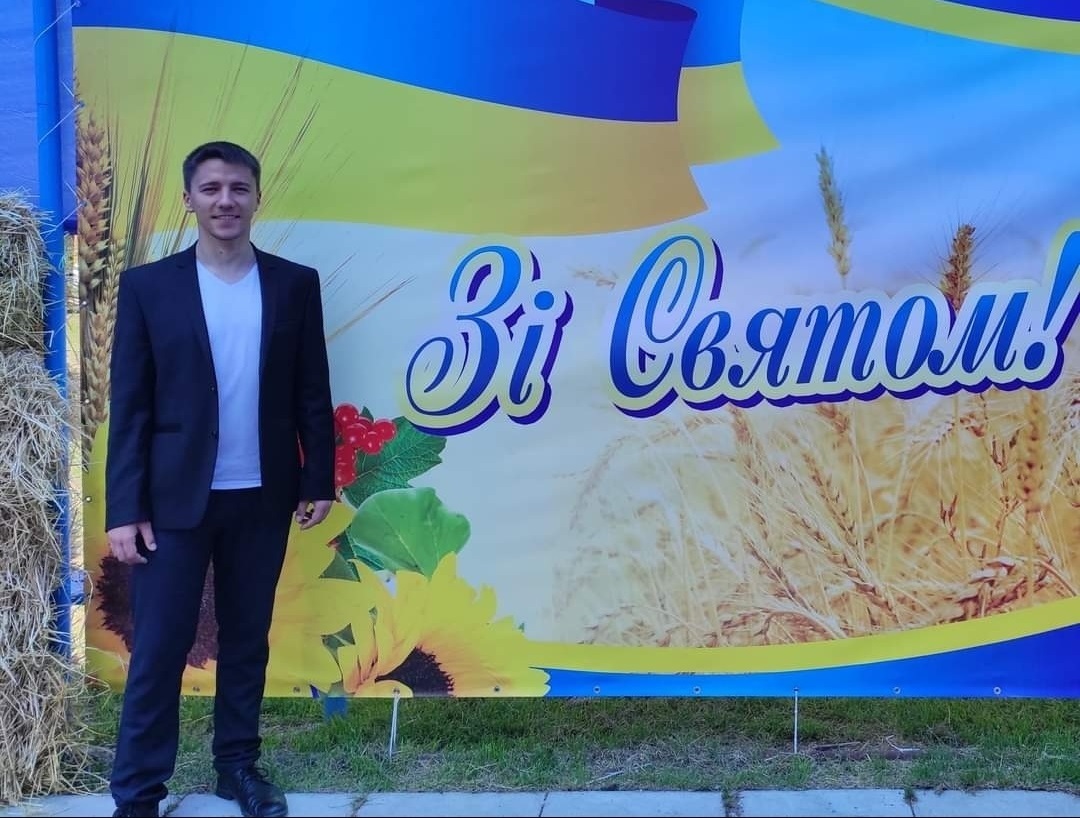
The last pre-war holiday

Before the war, the Sofiivska municipality planned to become one of the best places to live in Zaporizhzhia
Before dawn on February 24, Zakharevych was awakened by a phone call from the headmistress of one of the schools, who asked through tears: “Stanislav Volodymyrovych, is it true that the war has started? My parents from the Melitopol district just called me and said that they hear shots near their house!” “Calm down, it's alright, it can't be a war!” – Zakharevych replied strictly. He himself did not want to believe what was happening.
The village council carefully prepared for various scenarios: created shelters, placed concrete blocks at the entrances to villages and removed road signs. However, each of its employees hoped that the worst would not happen.
"As soon as we knew about the invasion, we called a meeting with employees of the village council, then gathered entrepreneurs and asked them to stock up with, if possible, food and fuel, which could later be used by our emergency services, – recalls Stanislav Zakharevych. – Then we called a meeting with the doctors. The work did not stop for a minute almost round the clock".
On the third day of the invasion, a huge column of Russian armored vehicles appeared on the roads of the Sofiivska municipality – about a hundred units of tanks and armored vehicles. Some of the residents of the municipality greeted them with bread and salt, but most of them went against and locked themselves in their homes. The Russians were also far from friendly: during the first days of the occupation, they shot two cars with civilian peasants from the Sofiivska municipality in the Berdyansk district; one of them was killed and two others were injured. However, even among the locals, there were those who did not bow to the invaders: when the Russians left a fuel tanker and APC unattended right in the field, someone turned them into a bright bonfire at night.
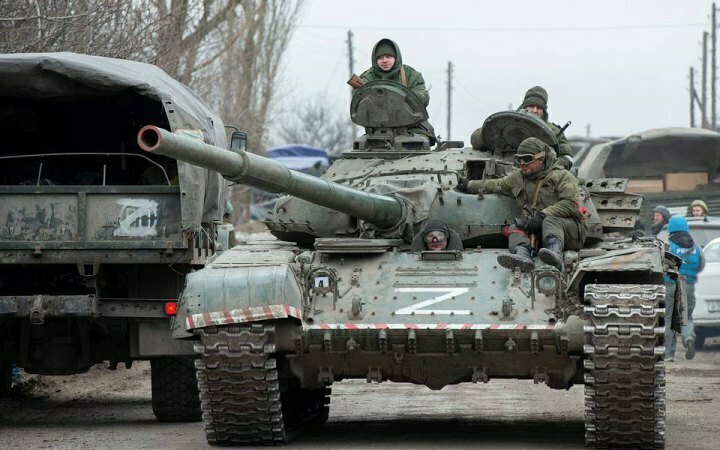
Russian tanks were heading to Zaporizhzhia along the roads of the Sofiivska municipality
Between two fires
The Russians were not really interested in what was happening in the villages of the Sofiivska municipality. Their transports passed the municipality in transit along the Mariupol – Zaporizhzhia highway. But in mid-March, Russian roadblocks appeared at the Sofiivsky intersection and in the village of Zelenivka.
"Then the Russians and the representatives of DPR who were on duty at these roadblocks tried to treat the locals more or less correctly and did not touch any of our people, - Stanislav Zakharevych continues. - But they had a very bad attitude towards the refugees from Mariupol, who were becoming more and more numerous. They kept picking on them, tossing their things upside down, and saying: “Why are you leaving? Tomorrow Zaporizhzhia will become the second Mariupol! On the contrary, in Marik, everything will be fine. We'll kill the nazis, and life will become better!” Fortunately, almost no one listened to them. Our people met Mariupol residents, fed them and settled them in kindergartens, cultural centers and their own homes. They accepted them as relatives".
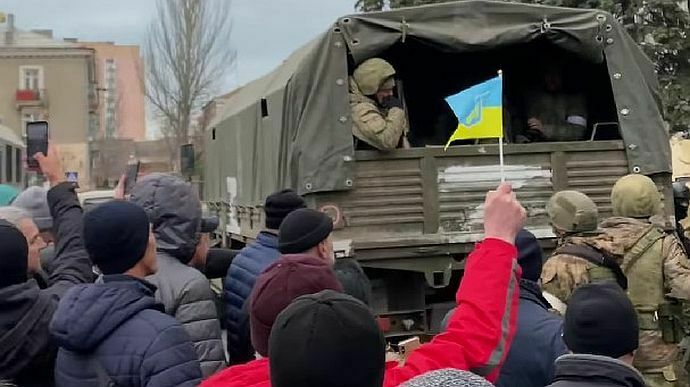
Rally for Ukraine in occupied Berdyansk on February 28, 2022
When the flow of refugees decreased at the end of March, the roadblocks were removed, and residents of the Sofiivska municipality started to breathe more freely. Stanislav Zakharevych and his team tried to provide the villagers with everything they needed. They agreed with entrepreneurs who had a certain supply of yeast that they would bake bread and not sell it at exorbitant prices. They organized the delivery of humanitarian aid and medicines from the unoccupied territory. They did everything possible to ensure that municipal structures worked as usual.
In early June, the occupation authorities finally drew attention to the “Sofiivsky villages”. At that time, Stanislav Zakharevych remained the last head of the municipality in the district: gauleiters were already appointed everywhere.
– Of course, I was aware that sooner or later they would come for me and that it would be better to leave before that, - he says. – But I was restrained by the fact that I didn't even have a formal reason to run away. Almost no one threatened me (only once by phone), no one kicked me out, I didn't have any raids. Do I have the right to leave under such conditions, leaving the people who just elected me to fend for themselves: I became the head of the municipality on November 12, 2021? I stayed. And then it was too late…
One day, a “DPR” military man and two traitorous local policemen came to Zakharevych's house “to offer him the position of acting mayor of Primorsk.” And when he refused, they ordered him to go with them. Local residents, who quickly ran from everywhere, said that they “will not give them the head”, entrepreneurs threatened to block the exit from the village. “Deenerivets” threatened a punitive raid by the Russian army in response. The situation escalated and it is unknown how it would have ended if Stanislav himself had not asked people to move away from the car. He said that he would go to Primorsk “for a conversation” – so it is necessary.
- They took me to the Primorsk police station and there they began to put pressure in every possible way, demanding that I head the city, – says Stanislav Zakharevych. - Local deputies and entrepreneurs were brought to me, also, of course, at gunpoint, and they told them: “This is your future mayor, however, he, does not still agree, but this is a question of time.” And they said to me: “Everyone works with us, you're the only one who shows off!” After 7 hours of such “persuasions”, I was informed that I was not going home. They put a black bag on my head and sent me to Berdyansk Colony No. 77. There, a Caucasian man with black glasses told me that I should think at night if I wanted to “stay with my people.” But no one came for me neither the next day nor the day after. That night lasted for me for 34 days.
In the cell. Says Stanislav Zakharevych
“In my cell, the heating worked round the clock, which made it very hot, in May it was about thirty-five degrees. I could breathe a little through the open window behind the bars. Civilian prisoners were taken out to the yard once every two weeks and for no more than half an hour, the military were not released at all. The Defenders of Mariupol and former military men were sitting with me, but most of them were civilians, and some of them were not even 17 years old yet. All prisoners were usually charged with “terrorism and partisanship.”
Most of all, the prisoners wanted to know what was happening at the front, and this is what every newcomer was asked about. When I told about the sinking of the missile cruiser Moskva, there was a real celebration in the cell.
There was a cell opposite ours where a married couple was being held: a husband and a wife. Further down the corridor there were two dungeons, where “educational” work was carried out almost daily. On the fourth day of my imprisonment, on the morning of April 28, I accidentally saw my grandfather taken out of a nearby cell by the FSB officers. Later, they brutally tortured him for more than an hour. Everyone could hear him shouting and them laughing. And then, when the FSB officers brought my unconscious grandfather back, they took me away.
The dungeon was impressive. In the middle, there was an iron table with two metal benches and two large containers with water, about eighty liters each. On the shelves on the opposite wall, there were various accessories for torture, as in the Middle Ages: piercing, cutting objects, power tools... The floor was covered in water and blood. One of the executioners, the one everyone called Andrey, asked if I was ready to cooperate.
- Either you agree to become acting mayor of Primorsk now, or we are breaking both of your legs right now, – he said.
I replied that I didn't want to not only become mayor, but anyone else also, and I didn't want to work anywhere at all, so I asked to let me go.
- Oh, no, this option is not suitable!
Andrey went to the shelf with tools, took a sledgehammer from there and told the masked men:
- Bring him here, let's break!
They took me by the arms and dragged me towards him.
- So, accept or legs?” - Andrey asked.
I remember it as if in a fog. I couldn't say anything, I felt numb, just waved my head: “No!”. I don't know why, but the executioners never carried out their threats. Perhaps they were afraid of the reaction of people who were very actively discussing my abduction in social networks, expressing sincere dissatisfaction about it.
Then the executioners threatened me, called me a mishandled Cossack, an agent of the SBU, assured me that I was going to rot in this prison, but they didn't touch me anymore. I went back to the camera.
The days went gray. At some point, I stopped hoping for dismissal: I was informed that they would not let me out, because I was “stubborn, daring and ideological.” But the news received from the new prisoners were encouraging. In May, one of them spoke about the successful defense of the Armed Forces of Ukraine in the Donetsk and Kharkiv Oblasts and that the Russians failed to cross the Siversky Donets. One night we heard the hum of planes and rockets. They were flying, as it seemed to us, from the north, from the territory controlled by Ukraine. This inspired hope, mixed with fear: if the invaders retreated, they would most likely simply kill us all. I said in despair that I did not mind that the Ukrainian air force and artillery would smash our prison into pieces, even with me.
Then the invaders reported that I should be exchanged, just like the Melitopol mayor Ivan Fedorov. I laughed when I first heard this: who Am I and who is Fedorov! And then suddenly I am called to talk to the “deputy head of the Berdyansk FSB”.
This conversation passed without torture. I was impressed by how well this “deputy” prepared for it. He voiced such facts from my student life and from the time of my work in the district council, which I myself had long forgotten. Then the FSB officer said that I was released on condition of compliance with three prohibitions. First: prohibition on leaving the territory of the municipality, “otherwise I will be shot at the first roadblock, and no one will find my body.” Second: prohibition on saying anything bad about Russia with the same threat. Third: I'm not allowed to quit. I said that I could not work except under Ukrainian legislation and under the Ukrainian flag. The FSB officer grimaced contemptuously, waving his hand: “Alright, you will be the head of the village council until we appoint our own person, and then you will go to school to work as a teacher.”
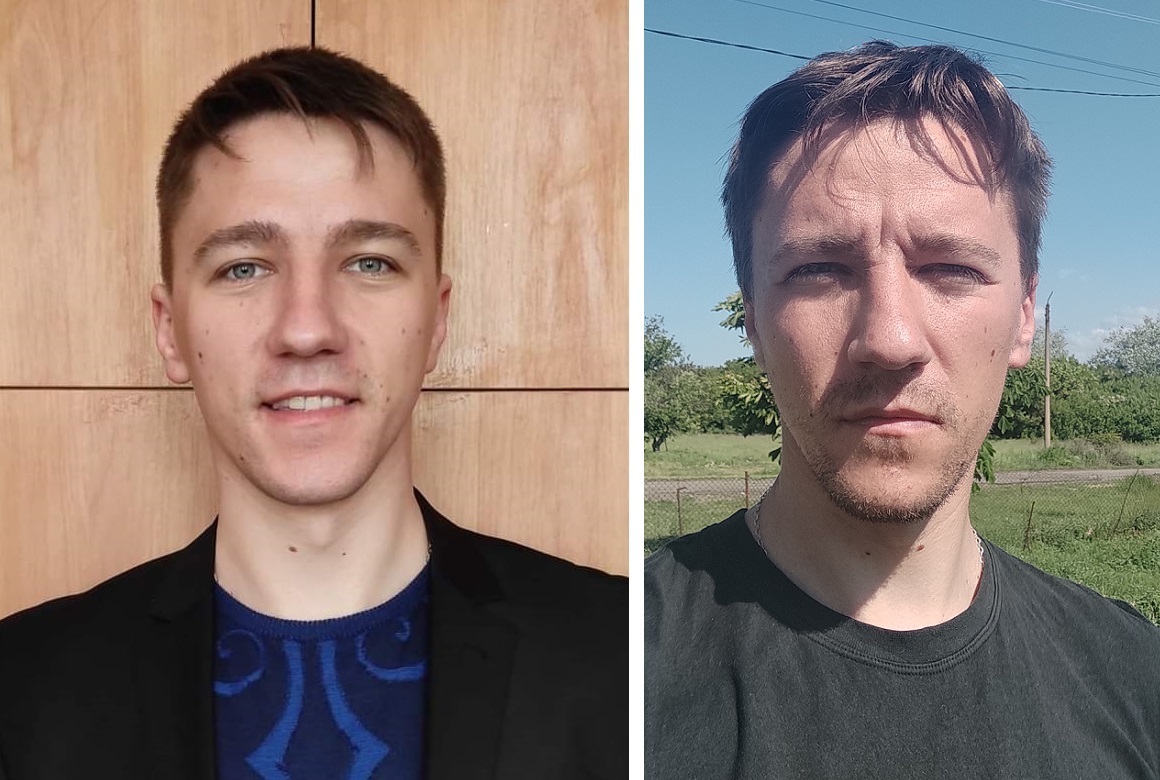
Stanislav Zakharevych before the war... and on the day of his release from a Russian prison
Escape
Zakharevych's phone was returned, and he called his mother and friends who came and picked him up. For two weeks after his imprisonment, he walked like a drunk, breathing fresh air and finally eating normal food. During the captivity, Stanislav lost 8 kg.
But they didn't left him in peace. A few days after his release, an “LPR” militant named Kichigin, who later took the position of “head of the military-civil administration of the Berdyansk district” and even survived an attempt on his life (on January 16 of this year, his car was blown up in Berdyansk), arrived in the municipality. He ordered the head of the Sofiivska municipality through local residents to come to Berdyansk the next day under the threat of “serious problems”. Together with the head, the managers of all municipal and communal institutions were supposed to arrive.
Stanislav Zakharevych went to Berdyansk himself, telling the managers that there was no need to go. The conversation with the collaborators lasted more than four hours. They demanded contacts of all managers, lists of all pensioners, and so on.
- I won't tell anything, - the village head replied shortly.
- You, as we can see, did not have enough 34 days in prison, you, as we can see, were poorly brought up there, – they threatened him. - In two days you must come here with all the lists!
At that moment, Stanislav realized that he had to run away. So at least he had a chance to save his life. He was very afraid that they would come for him the very next day. But he was lucky: the invaders celebrated Russia day, and they were not up to the brave pro-Ukrainian village head. Taking advantage of this, Zakharevych with his mother left for the Melitopol district, settling there with friends near the roadblock. He'd be the least looked for there.
As soon as he arrived, Stanislav immediately tried to negotiate with the carriers about a trip to the territory free from invaders. And this was not an easy task, because Zakharevych's story became public. There were legends about his disobedience to the conquerors, which people quietly told each other. Therefore, the carriers flatly refused to deal with him.
In the end, one of them agreed, but warned Stanislav: “If they recognize you at the roadblock, they will immediately shoot you.” Their car passed 14 such roadblocks, and at each Zakharevych was forced to go out and tell where and why he was going. However, none of the Russians could even imagine that the head of the community could be so young, so they didn't really check him. On June 13 last year, the fugitive finally found himself in a relatively safe place.
Gauleiters
Having rented a room for himself and his mother, he plunged into work. At first, he tried to organize the delivery of humanitarian aid to his municipality. There was enough food in the villages in the summer, but there was trouble with medicines. Stanislav managed to transfer 6 batches of medicines and several batches of food packages with especially scarce products.
In July, he got an office, which was provided by the head of a travel company – only for paying for utilities. There, Zakharevych opened a humanitarian center to help displaced people, who were becoming more and more numerous. They are still helped with food packages, hygiene products, blankets, bed linen, warm clothes, solar-powered lamps, sleeping bags, etc.
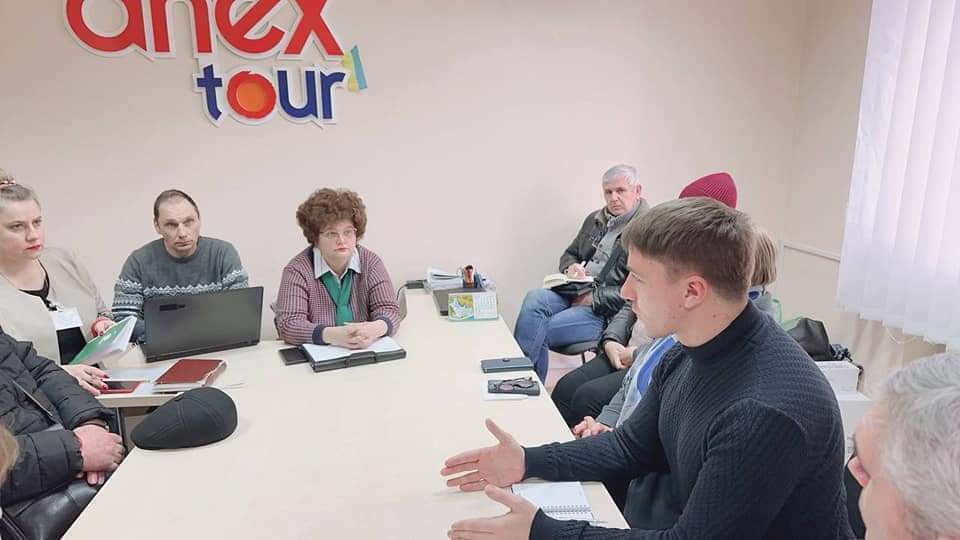
Humanitarian Center in Zaporizhzhia travel agency
At the end of September last year, it became impossible to transfer aid to the occupied territories. And on December 15, the invaders interrupted communication between the occupied territories. Since then, Stanislav Zakharevych has been creating a database of collaborators with photo and video evidence of infidelity. Local residents are willing to help him with this. Moreover: the collaborators themselves began to actively send incriminating evidence on each other in order to protect themselves in case of retreat of the Russians.
"I know that the orcs are now manipulating public opinion and imposing on people the thesis that Ukraine considers all those who remained under occupation to be traitors, – says Stanislav Volodymyrovych. – That's not true. I know many pensioners who, having received a Russian pension, convert it to hryvnias and transfer it to help the Armed Forces of Ukraine. Traitors are only those who went from house to house and campaigned for the “Russian world”, who taught children in schools to love Putin, who gave out public activists and ATO fighters to Russians. They will definitely be punished after the victory".
Thanks to his connections in the municipality, Stanislav Zakharevych knows everything that is happening in the occupied territory.
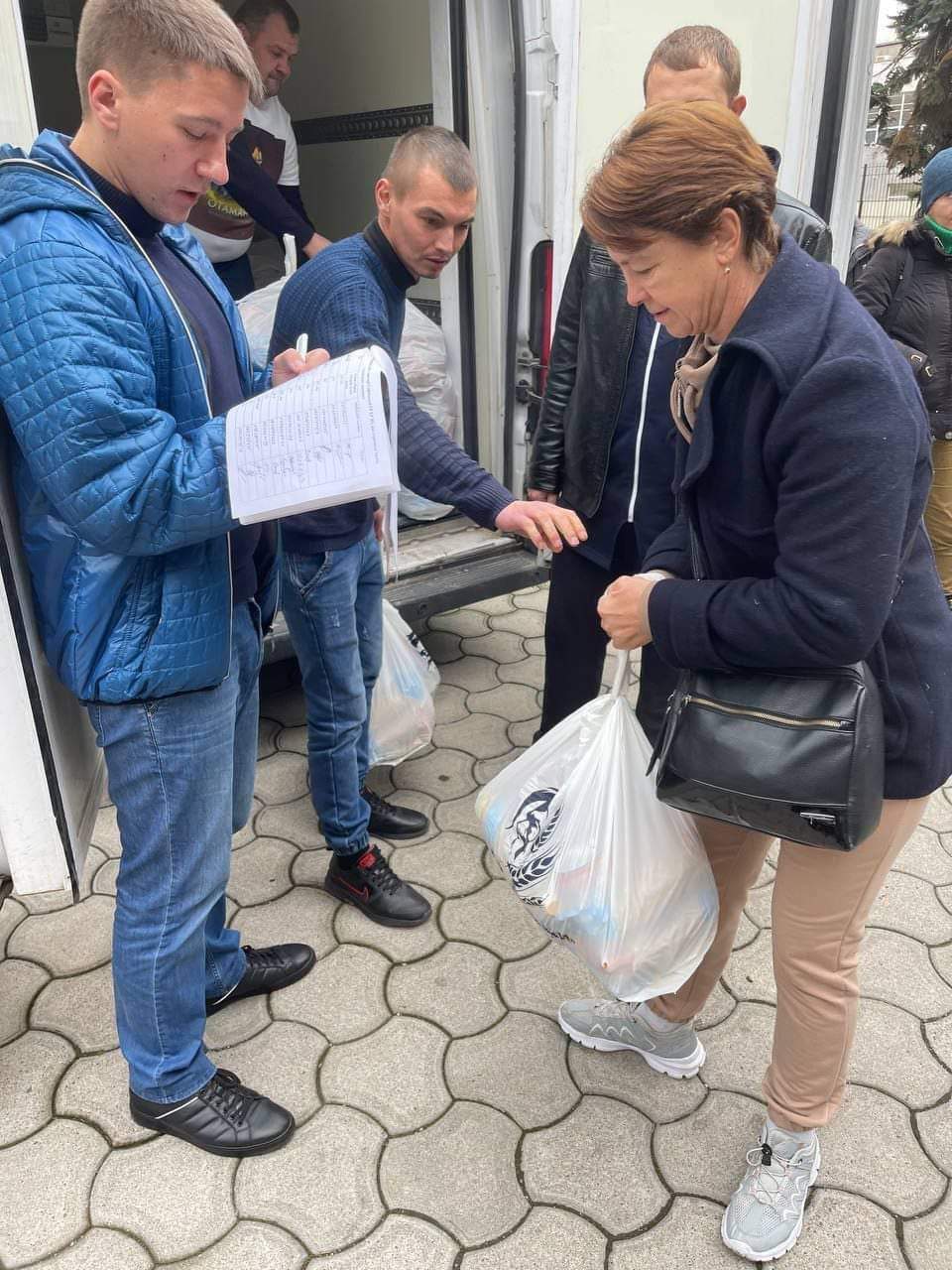
Distribution of humanitarian aid to residents of the Sofiivska municipality in Zaporizhzhia
"Despite the fact that about 40% of the municipality's population left, the invaders opened 5 of our 6 educational institutions in November, recruiting staff of, to put it mildly, mediocre quality, - he says. - Both a family doctor and paramedics work in the municipality, but there are almost no medicines. Those that come from Russia are usually of poor quality and extremely expensive. By the way, prices in the occupied territory for food products are 2-2.5 times higher than in the territory controlled by Ukraine. Household goods are sometimes 4-5 times more expensive. At the same time, the invaders demand that trade go in rubles, and the exchange rate is set at a predatory rate: one to one (on the black market, they give two rubles for one hryvnia). If at first the invaders tried to appease people with high payments, now they are constantly reducing them. If, for example, teachers at the beginning of the invasion could receive from 50 to 90 thousand rubles a month, now they receive 20-30 thousand rubles, and some of them do not even receive 20 thousand. The occupiers are withholding the wages of some collaborators. Social payments are not received by all residents of the municipality who need it. Moreover, people suspect that the money is stuck in the pockets of six newly appointed in the municipality gauleiters".
Gauleiters appeared two weeks after Stanislav Zakharevych's escape. The fact that five of them are non-locals gives Stanislav reason to consider the Sofiivska municipality patriotic, “because almost no one in it wants to cooperate with the “liberators”.
Interestingly, when appointing gauleiters, the orcs became completely entangled in the local administrative structure. So, according to their documents, on the territory of 11 villages, “Kolarovskaya (the old name of the Sofiivska municipality) unified territorial community (UTC)” and “Zelenovskaya UTC” formally operate, both with the center in the village of Kolarivka. The municipality seems to belong to the Primorsky district, but all administrative functions on its territory are performed by the so-called “Military-civil administration of the Berdyansk district”. At the same time, for example, new marriage documents indicate that they were issued by the “Simferopol district department”. The formal positions of gauleiters also differ. Some of them, according to the documents, is the head of the “Kolarovskaya UTC” and at the same time the deputy head of the “Zelenovskaya UTC”; someone is the headman, and someone is the head of the village council. Staff turnover, which has increased significantly since the occupation, only adds to this confusion.
You can't imagine how happy people are about “cotton”!
According to Stanislav Zakharevych, there is almost no work in the municipality. Some of the agricultural enterprises that were the basis of the prosperity of Sofiivka and other villages were stolen by the invaders. The “liberators” buy grain from many farmers at significantly lower prices than they were before the full-scale invasion. Accordingly, entrepreneurs reduce the wages of their employees and even reduce them. So, at the enterprise of one of the collaborators, the same employee received 15 thousand rubles, 12 thousand rubles and 9,5 thousand rubles in different months, after that he was fired, promising to hire again in March.
There are also cases when people receive payments from the occupiers with fake money, which is now very much in the occupied territories. At the same time, some local stores and even the post office stopped giving change, offering to take goods with this money or writing down the debt in a special notebook, which people immediately dubbed the “deposit notebook”.
All this is happening against the background of constant terror: raids, beatings, kidnappings, etc. According to Stanislav Zakharevych's calculations, about 40 residents of the municipality have already passed through Russian dungeons. Three of them are still being held in custody on false charges. One man was tortured to death. The property of all those who left is confiscated by the invaders. So, at the end of January, they announced the “nationalization” of the house of the village head, taking revenge on him for his escape.
"Before the decentralization reform, our municipality was far from as cohesive as it is now, - says Stanislav Volodymyrovych. - Several villages dominated by the Ukrainian population were kept apart, as well as villages with a Bulgarian population or with a mixed population. Previously, these villages were part of six village councils. Having created a certain financial self-sufficiency of the municipality, we tried to unite people around common ideas. One of them was the idea of universal welfare. We did it. Within a few months, people felt a certain community. And the amount of tax revenues has increased so much that even now, given that no taxes have been paid to the municipality budget for a year, we have funds in our accounts. And despite all the forecasts of gauleiters, we fulfill all our obligations to people".
With particular joy, the village head tells about how the Armed Forces of Ukraine recently covered several warehouses and bases of the invaders in two villages of the municipality.
"You can't even imagine how people in the occupation enjoy such things, - he says. - No one needs either Russians or Putin's Russia. Everyone, or at least the absolute majority, is waiting for the victory of Ukraine! My position is as follows: let everyone do everything in his power for victory, and then it will definitely happen. And Sofiivska municipality will once again turn into one of the best in our region".
Tags:
war stories report war stories special project
Область:
Запорізька областьГромади:
Софіївська територіальна громадаSource:
Decentralization Initiative Press Centre
20 February 2026
Місцева статистика: Як перетворити розрізнені...
У Києві відбулася стратегічна зустріч "Статистика громад", організована Державною службою статистики України за...
20 February 2026
I_CAN розпочав масштабування по всій Україні своєї Навчальної програми з управління публічними інвестиціями для...
20 February 2026
Language of Development Part 2: Funds and Instruments of EU Cohesion Policy
Language of Development Part 2: Funds and...
With the “language of development”, we describe not only the goals and principles of EU regional policy, but also...
19 February 2026
Анонс: вебінар «Обговорення змін до Порядку...
Які практичні кроки мають здійснити керівники та педагоги, щоб ефективно впровадити ключові зміни до Порядку...